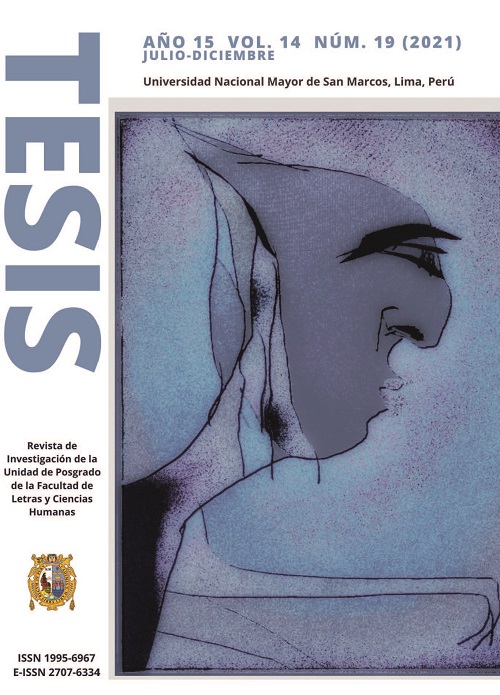The narrative feature in Tennessee Williams play The glass menagerie
DOI:
https://doi.org/10.15381/tesis.v14i19.21052Keywords:
drama, narrative, theater, The glass menagerie, Tennessee WilliamsAbstract
Tennessee Williams in his play The glass menagerie (1944) includes a unique narrative feature that is replicated from beginning to end of the plot. This article looks for the relevance of the narrative in the Williams’ play using a dramatic criteria. In the first place, we will study the relationship between narrativity in theater and how it has evolved over time. Then, we will propose some guidelines of dramatic theory as criteria for observing the text. Finally, we will address the use of narrative in Williams’ proposal, contrasting with autobiographical aspects, statements by the writer, fragments of the plot and another sources.
References
Abuín González, Á. (1997). El narrador en el teatro: la mediación como procedimiento en el discurso teatral del siglo XX. Universidad de Santiago de Compostela.
Alonso de Santos, José Luis (1999). La escritura dramática. (2.ª ed.). Castalia.
Barrientos Agustinho, C. (2013). La narración oral y el origen del teatro. Revista del Centro Cultural COOP de Argentina, 18, s/n
Bay, R. (1999). Introducción de El Zoo de Cristal en Williams, Tennessee, [1944] 2013. El zoo de cristal / Un tranvía llamado Deseo. Alba.
Chatman, S. (1990). Historia y discurso. La estructura narrativa en la novela y el cine. Altea, Taurus, Alfaguara.
Contreras Lorenzini, M. J. (2017). Del relato testimonial al cuerpo de la memoria: investigación performativa sobre la escenificación de testimonios de niños chilenos en dictadura. De Colombia, Cuadernos de Música, Artes Visuales y Artes Escénicas, 12(1).
Dale, N. y Cantón, M. (2020). El monólogo sortea el coronavirus. El País. https://elpais.com/espana/madrid/2020-11-28/el-monologo-sortea-elcoronavirus.html
De la Parra, Marco Antonio (1995). Cartas a un joven dramaturgo. Dolmen.
Dubatti, J. (2007). Filosofía del Teatro 1. Convivio, Experiencia, Subjetividad. Atuel.
Dubatti, J. (2017). Teatro-matriz, teatro liminal: estudios de filosofía del teatro y poética comparada. Paso de Gato.
Donahue, F. (1966). El mundo dramático de Tennessee Williams. Diana.
García Barrientos, J. L. (2004). Arbor: Teatro y narratividad. Revista General del Consejo Superior de Investigaciones Científicas sobre Ciencia, Pensamiento y Cultura, 699-700(CLXXVII), 509-524.
García Barrientos, J. L. (2012). Cómo se comenta una obra de teatro: ensayo de método. Paso de Gato.
García Yebra, V. (1974). Poética de Aristóteles. Gredos.
Kartun, M. (1995). El Cuentito. Revista Argentina del Getea, 1, pp 29-31.
Lawson, J. H. (1976). Teoría y técnica de la dramaturgia. Arte y Literatura.
Mamet, D. (1998). Los tres usos del cuchillo. Alba.
Oliva Bernal, C. (2004). La verdad del personaje teatral. Universidad de Murcia.
Palant, P. (1968). Teatro. El texto dramático. Centro Editor de América Latina.
Piga Torres, D. (2002). Dramaturgia. El guion cinematográfico y la obra teatral. Universidad Ricardo Palma.
Pimentel, L. A. (1998). El relato en perspectiva. Siglo Veintiuno Editores.
The Dick Cavett Show (1974). Entrevista de TV a Tennessee Williams. [Video]. YouTube. https://youtu.be/0z_4XFy3ISk.
Tobias, R. B. (1999). El guion y la trama. Ediciones Internacionales Universitarias.
Williams, T. (1983). Memorias. Bruguera.
Williams, T. [1944] (2013). El zoo de cristal / Un tranvía llamado Deseo. Alba.
Downloads
Published
Issue
Section
License
Copyright (c) 2021 Luis Javier Guerrero Espinoza

This work is licensed under a Creative Commons Attribution 4.0 International License.
THE AUTHORS RETAIN THEIR RIGHTS:
(a) The authors retain their trademark and patent rights, and also on any process or procedure described in the article.
(b) The authors retain the right to share, copy, distribute, execute and publicly communicate the article published in Tesis (Lima) (in example, depositing the article in an institutional repository or publish it in a book), with recognition of its initial publication in the Tesis (Lima).
(c) The authors retain the right to make a later publication of their work, to use the article or any part of it (for example: a compilation of their works, notes for conferences, thesis, or for a book), provided that they indicate the source of publication (authors of the work, magazine, volume, number and date).






